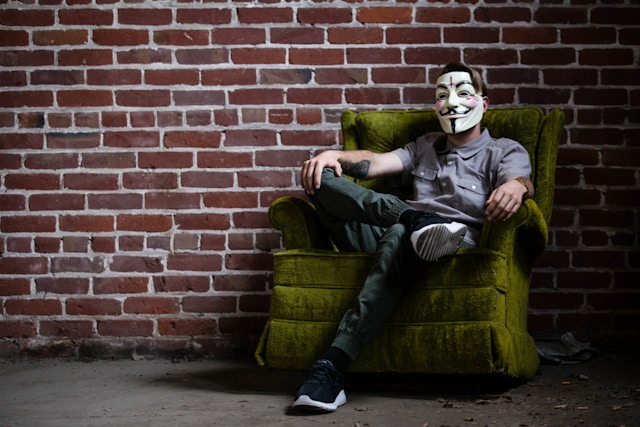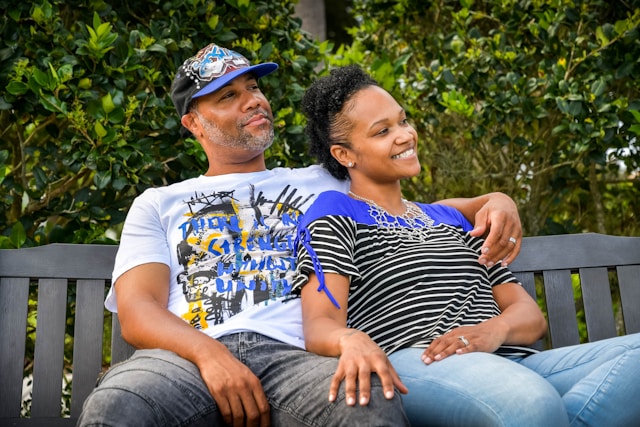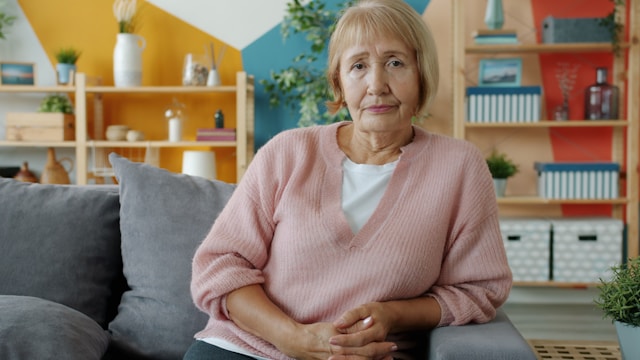Did you know that anxiety disorders are the most common mental health condition in the United States? According to the National Alliance on Mental Illness (NAMI), over 40 million adults in the U.S. (19.1%) have an anxiety disorder, and approximately 7% of children aged 3-17 experience issues with anxiety each year.
Here’s the troubling part: despite how common anxiety is, and despite the fact that it’s highly treatable, the Anxiety and Depression Association of America (ADAA) reports that only 37 percent of people receive the care they need.
Why? The answer often comes down to one powerful emotion: shame.
Many people feel embarrassed about their anxiety. They worry about what others will think. They tell themselves they should be stronger, that they’re being dramatic, that everyone else seems to handle life just fine. This shame becomes a silent barrier that keeps people suffering alone, avoiding the very help that could change their lives.
If you’ve felt this way, you’re not alone. And more importantly, you deserve to know why that shame is misplaced and what you can do about it.
Tired of shame keeping you from getting help?
Our compassionate therapists in Willowbrook and Park Ridge understand the stigma around anxiety and create a judgment-free space for healing.
Understanding the shame that comes with anxiety
Shame and anxiety have a complicated relationship. Often, they feed off each other in ways that make both worse.
Think about the common symptoms of anxiety for a moment. Many of them are visible to others or involve social situations, which can feel incredibly exposing:
- Excessive sweating. When your body goes into fight-or-flight mode, you sweat. This might happen during a presentation at work, at a social gathering, or even just sitting in a meeting. You worry that people notice, which makes you more anxious, which makes you sweat more.
- Changes in speech patterns. Some people talk very quickly when anxious, their words tumbling over each other. Others find themselves going blank, unable to speak at all when they feel overwhelmed. Both can feel embarrassing in the moment.
- Avoidance behaviors. Maybe you decline invitations, avoid phone calls, or pass up opportunities because your anxiety tells you it’s safer to stay in your comfort zone. Then you feel ashamed for missing out or letting people down.
- Physical symptoms. Digestive problems, blushing, shaking hands, a racing heart. These bodily responses can happen at the worst possible times, making you feel like your body is betraying you.
- Overthinking and fixation. You replay conversations in your head for days, wondering if you said the wrong thing. You catastrophize about upcoming events. You know it’s excessive, but you can’t seem to stop, which adds another layer of frustration and shame.
Any of these experiences can draw attention to yourself, which is often exactly what you don’t want when you have anxiety. So it’s not hard to see how feelings of shame develop.
But here’s what’s important to understand:
this fear of embarrassment, this shame you feel, is real and deserves to be validated. Your feelings make sense given what you’re experiencing. At the same time, the shame itself is based on some fundamental misunderstandings about anxiety.
The stigma around mental health
Beyond personal feelings of shame, there’s also a broader cultural stigma around mental health that affects how people view anxiety disorders.
Despite growing awareness about mental health, many outdated beliefs persist. You might have heard or internalized messages like these:
- “Mental health problems are a sign of weakness.” This couldn’t be further from the truth, yet many people still believe that struggling with anxiety means you’re not strong enough or tough enough to handle life.
- “You should be able to fix your own problems.” There’s a pervasive idea that asking for help represents failure, that “normal” people should be able to manage their emotions on their own.
- “Anxiety isn’t a real illness.” Some people dismiss anxiety as just stress or worry that everyone experiences, minimizing the very real impact that anxiety disorders have on people’s lives.
- “Going to therapy means you’re crazy.” This stigma around therapy itself prevents many people from seeking help, even when they know they’re struggling.
These beliefs are reinforced in subtle and not-so-subtle ways.
Maybe you grew up in a family where emotions weren’t discussed openly. Maybe you’ve heard people make dismissive comments about therapy or mental health. Or maybe you’ve internalized messages from media, social expectations, or past experiences that taught you to hide your struggles.
According to research on mental health stigma, these attitudes don’t just hurt feelings. They have real consequences, preventing people from seeking treatment and leading to worse outcomes over time. The American Psychiatric Association reports that more than half of people with mental illness don’t receive help for their disorders, often avoiding or delaying treatment due to concerns about being treated differently or fears of losing their jobs and livelihood. Research shows that stigma and discrimination contribute to worsening symptoms and reduced likelihood of getting treatment, with effects including reduced hope, lower self-esteem, increased psychiatric symptoms, difficulties with social relationships, and reduced likelihood of staying with treatment.
The truth is that mental health stigma is a societal problem, not a personal one. You’re not weak for experiencing it. You’re dealing with both an anxiety disorder and the weight of cultural attitudes that don’t serve anyone well.
Why shame about anxiety is misplaced
Now let’s talk about why you shouldn’t feel ashamed of your anxiety. There are several important reasons.
You didn’t choose to have anxiety
This might seem obvious, but it’s worth stating clearly: you didn’t choose to develop an anxiety disorder. You’re probably not ashamed of spraining your ankle or catching a cold, and having an anxiety disorder shouldn’t be any different.
Anxiety disorders have complex causes. Genetics play a role. Brain chemistry is involved. Life experiences, especially early childhood experiences, can contribute. Trauma, major life changes, chronic stress, certain medical conditions, all of these factors can influence whether someone develops an anxiety disorder.
Just as we all have varying heights or varying athletic abilities, we all have varying levels of baseline anxiety. Some people are naturally more prone to it than others. That’s not a moral failing or a character flaw. It’s simply part of human diversity.
It’s crucial to stop equating the presence of anxiety with personal failure. Instead, it should be viewed as a condition that exists and can be managed, much like diabetes, asthma, or any other health condition that requires ongoing attention.
Being compassionate toward yourself about having anxiety, rather than berating yourself for it, can actually help with recovery. Self-compassion reduces the secondary suffering that comes from fighting against your reality, allowing you to put your energy toward helpful coping strategies instead.
Your anxious mind brings unique strengths
Here’s something that often gets overlooked: the same qualities that contribute to anxiety can also be significant strengths in the right contexts.
People with anxiety often possess remarkable abilities that others don’t have to the same degree. You might be highly intuitive, picking up on details and potential problems that others miss. This makes you excellent at planning, risk assessment, and preparation.
You probably think deeply about things. While this can lead to overthinking, it also means you bring a thoughtful, thorough approach to decisions and projects. You consider angles that others don’t.
Many people with anxiety are also highly empathetic and sensitive to others’ emotions. You notice when someone seems upset. You think about how your actions affect people around you. This emotional intelligence is valuable in relationships, in team settings, and in any work that involves understanding people.
Your mind’s tendency to explore possibilities (even the unlikely or scary ones) means you often bring creative problem-solving skills to challenges. You can see potential obstacles before they arise, which can be incredibly useful in the right setting.
The key is learning to harness these cognitive patterns in ways that serve you, rather than letting them run wild into unproductive worry. But the underlying mental agility and depth of thought? Those are assets worth recognizing.
Living with anxiety requires real courage
Let’s acknowledge something important: dealing with anxiety every single day takes strength.
Anxiety is an obstacle you face constantly. Some days it’s a whisper in the background. Other days it feels overwhelming. Either way, it’s there, requiring your attention and energy in ways that people without anxiety disorders don’t have to manage.
Would it be nice to not have to deal with so many worrisome thoughts? Of course. Would it be easier to go through life without the physical symptoms, the racing heart, the tightness in your chest, the exhaustion that comes from being on high alert? Absolutely.
But here’s what matters: you keep going anyway. You get up in the morning despite the anxiety. You go to work, you show up for your family, you handle responsibilities, all while managing an internal experience that can be genuinely difficult.
When anxiety tells you to avoid something, you often push through and do it anyway. When it tries to convince you that something terrible will happen, you move forward despite that fear. That takes real resilience.
The fact that you’re reading this article right now means you’re not giving up. You’re looking for understanding, for help, for ways to improve your situation. That’s strength. That’s courage. And that’s absolutely something to feel proud of, not ashamed of.
Anxiety often has roots in things beyond your control
Here’s another important piece to understand: for many people, anxiety doesn’t develop in a vacuum. It often has roots in early life experiences, particularly in childhood.
According to Marisa Seper, a Licensed Clinical Social Worker (LCSW) at Life Counseling Institute who specializes in trauma-informed care,
“Many adults come to therapy to heal their ‘inner child.’ I approach this using trauma-informed methods, helping clients create a new internal narrative and process old wounds with the same compassion and specialized care I use with children.”
Research shows that adverse childhood experiences, attachment disruptions, family dysfunction, childhood trauma, or growing up in an environment where it wasn’t safe to express emotions can all contribute to adult anxiety. A study published in the Journal of Affective Disorders found that childhood adversity had independent and additive contributions to depression and anxiety in older adulthood, with a dose-response relationship where a greater number of cumulative adversities were associated with poorer mental health outcomes.
If your anxiety has these kinds of roots, it’s especially important to understand that you’re not to blame. A child who develops anxious coping mechanisms in response to their environment is doing the best they can to survive and make sense of their world. That child, that young version of you, deserves compassion, not criticism.
Even if you can’t point to specific traumatic experiences, the way you learned to view yourself and the world during your formative years has a profound impact on your adult mental health. Unpacking and healing these early patterns is often an important part of addressing anxiety in adulthood.
Why shame makes anxiety worse
Beyond being misplaced, shame about anxiety is also actively harmful. It creates a vicious cycle that makes everything harder.
When you feel ashamed of your anxiety, you’re less likely to talk about it with others. This isolation means you miss out on support, understanding, and the normalization that comes from realizing others struggle too.
Shame also adds a second layer of suffering on top of the anxiety itself. Not only are you dealing with anxious thoughts and symptoms, but you’re also beating yourself up for having them. You’re anxious about being anxious. This meta-anxiety compounds the problem.
Additionally, shame interferes with help-seeking. If you’re embarrassed about your anxiety, you’re less likely to reach out to a therapist, talk to your doctor, or even research coping strategies. This means you stay stuck longer than necessary, suffering with a condition that could be effectively treated.
Research has shown that shame is associated with worse mental health outcomes across the board. It interferes with healing, maintains problematic patterns, and keeps people trapped in cycles of suffering.
The antidote to shame is vulnerability and self-compassion. When you can acknowledge your anxiety without judgment, when you can talk about it openly with trusted people, when you can approach yourself with kindness rather than criticism, that’s when real change becomes possible.
Common misconceptions that fuel shame
Part of what keeps shame alive are misconceptions about anxiety and mental health treatment. Let’s address some of the most common ones.
“I should be able to fix my own problems”
This is perhaps the most pervasive belief that keeps people from getting help. There’s a cultural narrative, especially strong in American culture, that values independence and self-sufficiency above all else. Asking for help can feel like admitting defeat.
But think about it this way: if your tooth was hurting and you couldn’t chew on one side of your mouth, would you feel ashamed to call your dentist? Of course not. You’d recognize that dental problems require specialized knowledge and training to address properly.
The same is true for mental health. Therapists have spent years studying how the mind works, how anxiety develops and maintains itself, and what interventions are most effective. They can see patterns you might not notice in yourself and offer tools and perspectives you might not have access to on your own.
Seeking help isn’t weakness. It’s wisdom. It’s recognizing that some problems benefit from expert guidance and support.
“If I go to therapy, it means I’m crazy”
This misconception stems from outdated ideas about what therapy is and who it’s for. Decades ago, therapy was primarily associated with severe mental illness. That’s simply not the case anymore.
Today, therapy is a resource for anyone who wants to improve their mental health, work through challenges, or develop better coping skills. People go to therapy for all sorts of reasons: relationship problems, stress management, life transitions, grief, personal growth, and yes, anxiety.
Going to therapy doesn’t mean there’s something fundamentally wrong with you. It means you’re taking your mental health seriously and investing in your wellbeing. That’s something to be proud of.
“People go to therapy because they want attention”
This cynical view misunderstands why people seek help. Therapy is actually quite the opposite of attention-seeking. It’s a private, confidential space where you can work on yourself without judgment.
People go to therapy because they’re suffering and want relief. They go because they’re stuck and want to move forward. They go because they want to understand themselves better and build a more fulfilling life. These are all valid, healthy reasons that have nothing to do with seeking attention.
“I don’t want to look weak”
Here’s the thing about strength: it’s not about never struggling. It’s about how you respond when you do struggle.
Acknowledging that you need support, that you can’t do everything alone, that you’re dealing with something difficult, that takes strength. Pretending everything is fine when it’s not? That’s not strength. That’s just suffering in silence.
Real courage looks like being honest about your challenges and taking steps to address them. Real strength includes being vulnerable enough to admit when you need help.
How therapy helps with shame and anxiety
So how does therapy actually help when you’re dealing with both anxiety and the shame that often accompanies it?
Creating a judgment-free space
One of the most powerful aspects of therapy is simply having a space where you can talk about your anxiety without fear of judgment. Your therapist isn’t shocked by what you share. They’ve heard it before. They understand.
This experience of being heard and accepted, anxiety and all, begins to chip away at shame. When someone with expertise listens to your struggles and responds with compassion rather than criticism, it helps you start developing that same compassion toward yourself.
Understanding where anxiety comes from
Therapy helps you make sense of your anxiety. Where did it come from? What maintains it? How do your thoughts, behaviors, and past experiences all fit together?
This understanding itself can be healing. When you recognize that your anxiety has identifiable causes and follows predictable patterns, it becomes less mysterious and scary. It shifts from feeling like a personal failing to being a psychological process that can be understood and addressed.
Processing old wounds
For many people, anxiety is tangled up with past experiences, often from childhood. Therapy provides a space to process these old wounds with the compassion and care they deserve.
Whether you’re working through specific traumatic events or more subtle patterns from your upbringing, therapy helps you create a new narrative about yourself and your worth. This work addresses not just the anxiety symptoms but the deeper roots of shame and self-criticism.
Learning practical skills
Beyond insight and processing, therapy also teaches you concrete skills for managing anxiety. You learn how to identify unhelpful thought patterns, how to respond to anxious feelings more effectively, how to gradually face feared situations, and how to take care of your mental health on an ongoing basis.
These practical tools give you a sense of agency. Instead of feeling helpless in the face of your anxiety, you develop confidence that you can influence how you feel and respond.
Challenging the shame itself
A good therapist will also directly address the shame you feel about having anxiety. They’ll help you examine where those shame messages come from, whether they’re accurate or fair, and how to develop a more compassionate relationship with yourself.
This might include exploring your self-talk, identifying shame triggers, practicing self-compassion exercises, or working on accepting imperfection. The goal is to separate anxiety (a mental health condition) from your worth as a person.
Taking the first step: moving from shame to self-compassion
If you’ve been living with anxiety and shame, how do you begin to shift toward a different way of relating to yourself?
Start with self-awareness
Begin noticing when shame shows up. What situations trigger it? What does your internal voice sound like when you’re feeling ashamed? Are there particular thoughts that come up repeatedly?
Simply becoming aware of shame, without trying to immediately fix it, is an important first step. You can’t change patterns you don’t recognize.
Practice talking about your anxiety
Shame thrives in secrecy. When you keep your anxiety hidden, it feels bigger and more shameful. When you start talking about it, even in small ways, you often find that others are more understanding than you expected.
Start with someone you trust. You don’t have to share everything at once. Even saying something like “I’ve been dealing with some anxiety lately and it’s been hard” can be a powerful step.
Challenge shame-based thoughts
When you notice thoughts like “I should be stronger than this” or “Everyone else has it together except me,” pause and question them.
Is it really true that everyone else has it together? (Spoiler: it’s not.) Is strength really about never struggling? What would you say to a friend who was dealing with what you’re dealing with?
This kind of cognitive work, questioning and reframing unhelpful thoughts, is actually a core component of many therapeutic approaches for anxiety.
Seek professional support
If shame has been keeping you from reaching out for help, consider this your permission to take that step. You don’t have to wait until your anxiety is unbearable. You don’t have to have everything figured out before you start therapy.
Therapists who work with anxiety understand the role that shame plays. They’re prepared to help you work through both the anxiety symptoms and the shame that accompanies them. At Life Counseling Institute in Willowbrook and Park Ridge, therapists use trauma-informed, compassionate approaches to help clients move from shame to self-acceptance.
Remember: progress isn’t linear
As you work on accepting your anxiety and letting go of shame, remember that this isn’t a straight path. Some days you’ll feel more compassionate toward yourself. Other days the shame might feel overwhelming again.
That’s okay. That’s normal. Healing isn’t about never struggling again. It’s about developing new patterns over time, with plenty of backsliding and starting over along the way. Be patient with yourself in this process.
Frequently Asked Questions About Anxiety Shame
Why do I feel so embarrassed when I have anxiety symptoms in public?
Feeling embarrassed about visible anxiety symptoms makes perfect sense when you understand what’s happening. First, anxiety itself makes you hyper-aware of how others perceive you, so you’re more likely to notice (or imagine) that people are paying attention to your sweating, shaking, or blushing. Second, there’s a vulnerability in having your internal state be visible to others. We’re taught from a young age to “keep it together” in public, so when your body betrays that by showing signs of distress, it can feel like you’re failing at a basic social expectation. Third, embarrassment itself triggers more anxiety, creating a feedback loop. Research shows that people with anxiety often overestimate how much others notice their symptoms and how negatively others judge them. In reality, most people are too focused on themselves to pay much attention to others’ minor physical symptoms. Working with a therapist can help you challenge these fears about others’ judgments and gradually become more comfortable with the possibility that someone might notice you’re anxious.
How can I tell if my shame about anxiety is normal or if it’s becoming a bigger problem?
Some degree of self-consciousness about anxiety is common, especially when you’re first recognizing that you have an issue. However, shame becomes a bigger problem when it starts preventing you from seeking help, causes you to isolate yourself, leads to harsh self-criticism that makes your anxiety worse, or develops into a pervasive sense that you’re fundamentally flawed or broken. If you find yourself avoiding conversations about mental health, declining invitations because you’re ashamed of how you might feel or act, or spending significant time criticizing yourself for having anxiety, that shame has likely crossed from a passing feeling into something that needs attention. Another red flag is if you’ve recognized you need help but shame has kept you from reaching out for months or years. At that point, the shame itself is causing harm independent of the anxiety and deserves to be addressed directly in therapy.
I grew up in a family that didn’t talk about emotions or mental health. How do I overcome that to get help now?
Many people struggle with this exact situation. When emotional expression wasn’t modeled or allowed in your family, you might not have developed the language to talk about internal experiences, and you may have internalized messages that feelings should be kept private. The first thing to recognize is that your family’s approach to emotions doesn’t have to be your approach. As an adult, you get to decide how you want to handle your mental health, even if it looks different from what you learned growing up. Starting therapy can actually help you develop the emotional vocabulary and skills that weren’t taught in childhood. You don’t need to be good at talking about feelings before you start therapy. That’s something you can learn in the process. Many therapists are experienced in working with clients who come from families where emotions were taboo, and they can help you navigate this transition at a pace that feels comfortable. You might start by acknowledging to your therapist that this is new and uncomfortable for you. That awareness itself is valuable information.
What if I feel ashamed about needing medication for my anxiety?
The shame around taking medication for anxiety often comes from the same stigma that surrounds mental health treatment in general, combined with specific beliefs that medication is a “crutch” or that you should be able to manage without it. Let’s be clear: if medication helps you function better and feel better, that’s all that matters. Many anxiety disorders have a biological component involving brain chemistry, and medication can help address that aspect of the condition. Taking medication for anxiety is no different from taking insulin for diabetes or blood pressure medication for hypertension. It’s a medical intervention for a medical condition. Some people benefit from therapy alone, some benefit from medication alone, and many people find that a combination of therapy and medication works best. There’s no moral superiority to any particular approach. What matters is finding what works for you. If shame about medication is keeping you from considering it as an option, bring that up with your doctor or therapist. They can help you weigh the actual risks and benefits rather than making decisions based on stigma.
How do I respond to people who say I just need to “get over it” or “stop worrying so much”?
Comments like these, however well-intentioned, reflect a fundamental misunderstanding of anxiety disorders. They’re treating anxiety as if it’s simply a choice or a matter of willpower, when in reality it’s a complex condition involving brain chemistry, learned patterns, and often genetic predisposition. You have a few options for how to respond. If the person is someone you care about and want to educate, you might say something like, “I appreciate that you’re trying to help, but anxiety disorders aren’t something you can just decide to stop having. It’s like telling someone with asthma to just breathe normally. I’m working on managing it, but it takes more than just willpower.” If it’s someone you don’t feel comfortable explaining things to, a simple “Thanks, I’m handling it” can end the conversation without getting into details. Remember that other people’s misunderstandings about anxiety aren’t your responsibility to fix. Some people simply won’t get it unless they’ve experienced it themselves. What matters more is finding a few people in your life who do understand and can provide real support. A good therapist can also help you develop responses to these kinds of comments and work through the hurt or frustration they might cause.
Is it possible to fully overcome the shame associated with anxiety, or is it something I’ll always struggle with?
For most people, shame about anxiety does significantly decrease over time with the right support and work. As you better understand your anxiety, develop skills to manage it, and practice self-compassion, the shame typically lessens. Many people reach a point where they can talk about their anxiety without embarrassment, can acknowledge it as simply one aspect of their health without it defining them, and can advocate for their needs without feeling ashamed. That said, shame can sometimes resurface, especially during stressful periods or when anxiety symptoms are more intense. The difference is that you develop tools to recognize and address shame when it shows up, rather than being controlled by it. Complete freedom from ever feeling a twinge of self-consciousness might not be realistic, but getting to a place where shame isn’t a major factor in your life absolutely is. Working with a therapist who specifically addresses shame, particularly someone trained in trauma-informed or compassion-focused approaches, can accelerate this healing process considerably.
What should I look for in a therapist if shame is a big issue for me?
When shame is a significant part of your experience with anxiety, you want a therapist who creates a warm, non-judgmental environment and who has experience working with shame directly. During an initial consultation, pay attention to how the therapist responds when you mention feeling ashamed. Do they normalize it and express understanding? Do they seem comfortable discussing shame, or does it seem like something they’ll gloss over? Ask potential therapists about their approach to working with shame. Therapists trained in trauma-informed care, compassion-focused therapy, or Internal Family Systems often have explicit training in addressing shame. You might also ask if they’ve worked with clients who struggle with similar shame issues around anxiety. Beyond specific training, the fit and relationship with your therapist matters enormously. You should feel, over time, that this is someone you can be honest with, someone who sees your worth even when you can’t see it yourself. Trust your gut. If a therapist feels judgmental or dismissive, even subtly, keep looking. The right therapist will create a space where your shame can be examined and healed rather than reinforced.
Ready to Get Help?
If shame has been keeping you from getting help for your anxiety, our team at Life Counseling Institute in Willowbrook and Park Ridge is here to support you with compassion and evidence-based care. We offer both in-person and telehealth counseling throughout Illinois.
You May Also Find It Helpful To Read:
- Managing Your Anxiety by Becoming AWARE
- The Increasing Issue of Eco-Anxiety and Finding the Right Therapist
- Worry is an Active Process: How Counseling for Anxiety Can Help You Break the Cycle
Citations:
- National Alliance on Mental Illness. “Anxiety Disorders.” NAMI: National Alliance on Mental Illness, reviewed December 2017. https://www.nami.org/About-Mental-Illness/Mental-Health-Conditions/Anxiety-Disorders
- Anxiety and Depression Association of America. “Facts & Statistics.” Anxiety and Depression Association of America (ADAA). https://adaa.org/understanding-anxiety/facts-statistics
- American Psychiatric Association. “Stigma, Prejudice and Discrimination Against People with Mental Illness.” Psychiatry.org. https://www.psychiatry.org/patients-families/stigma-and-discrimination
- Lian, J., Kiely, K.M., Callaghan, B.L., & Anstey, K.J. (2024). Childhood adversity is associated with anxiety and depression in older adults: A cumulative risk and latent class analysis. Journal of Affective Disorders, 354, 181-190. https://doi.org/10.1016/j.jad.2024.03.016









